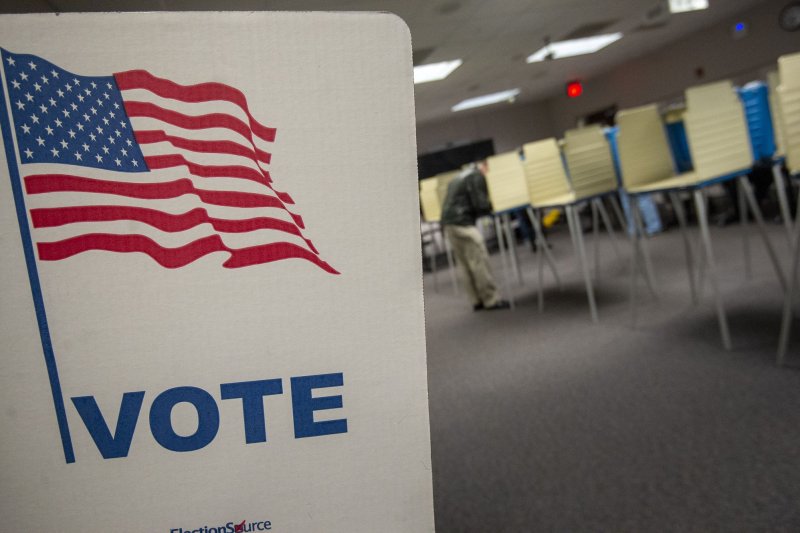1 of 4 | Thursday's report notes that there are close to 600 federally recognized tribal nations in the United States -- including 229 in Alaska and 345 located in about three dozen other states. File Photo by Bonnie Cash/UPI |
License Photo
March 24 (UPI) -- Government leaders at all levels must do more to protect voting rights for Native Americans, who traditionally vote at lower rates than other citizens, a White House report on the issue said Thursday.
The report is the result of an executive order President Joe Biden signed last year that sought to protect voting rights and create a committee to examine the challenges and difficulties that keep Indigenous communities from having access to the ballot box.
According to Thursday's report, some of the obstacles faced by Native American voters include language barriers, physical disabilities, cultural disrespect, isolation and persistent poverty.
"Congress still has the responsibility to act, but the president is committed to using every tool at his disposal to protect the sacred right to vote," the White House said in a statement. "The report released today chronicles the barriers Native voters face and recommends actions for policymakers at every level to help break these barriers down.
"The unprecedented nature and scale of the present attacks on voting rights must be met with federal legislation."
The 54-page report was compiled with the help of a steering committee, tribal leaders and Native American communities.
There are close to 600 federally recognized tribal nations in the United States -- including 229 in Alaska. The other 345 are located in about three dozen other states. Native Americans make up 22% of Alaska's population, 16% in Oklahoma, 12% in New Mexico, 11% in South Dakota and 9% in Montana.
![]()
Native American voters have traditionally been an important constituency in presidential elections. In 2020, an increase in Native American turnout helped President Joe Biden win Arizona -- a state that hadn't voted for a Democrat since
Bill Clinton in 1996. File Photo by Jim Ruymen/UPI
Adding to voting difficulties, the study says that the size of Native populations have traditionally been underestimated.
"While these increased numbers represent the growth and improved recognition of Native populations in the United States, it is important to note that Native populations have in the past been undercounted, and it is not yet clear whether or to what extent that pattern persisted in 2020," the report states.
"The Census Bureau estimated that in 2010, American Indians and Alaska Natives living on tribal lands ... were undercounted by 4.9%."
Among other things, the report calls for officials at the federal, state and local levels to guarantee that existing laws are equitably implemented and they allow tribal identification cards to be accepted as voter identification. The officials should also make registration sites, mail drops and polling places more convenient to Native voters, it said.
Further, Thursday's study calls for governments to make special efforts to protect language-minority and disabled voters and train election and poll workers on cultural issues that could arise at registration and polling locations.
Native American voters have traditionally been an important constituency in presidential elections. In 2020, an increase in Native American turnout helped President Joe Biden win Arizona -- a state that hadn't voted for a Democrat since Bill Clinton in 1996.
"For far too long, members of tribal nations and Native communities have faced unnecessary burdens when they attempt to exercise their sacred right to vote," the White House said.
"State laws and local practices also present too many Native voters with undue impediments to full and fair exercise of the franchise, including barriers in receiving information about the voting process, discriminatory redistricting, and burdens in voter registration, voter identification, voting in person, and voting by mail."
Some of the recommendations in the report include passing the Freedom to Vote Act and the John Lewis Voting Rights Advancement Act, possibly adding U.S. Postal Service routes and staff in areas serving Native communities and offering language assistance and translators for Native voters.
Vice President Kamala Harris speaks about the Property Appraisal and Valuation Equity (PAVE) report on Wednesday. Pool photo by Samuel Corum/UPI |
License Photo

















